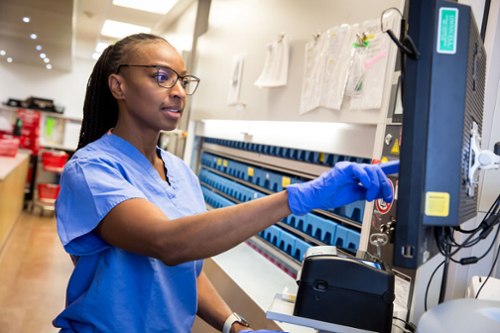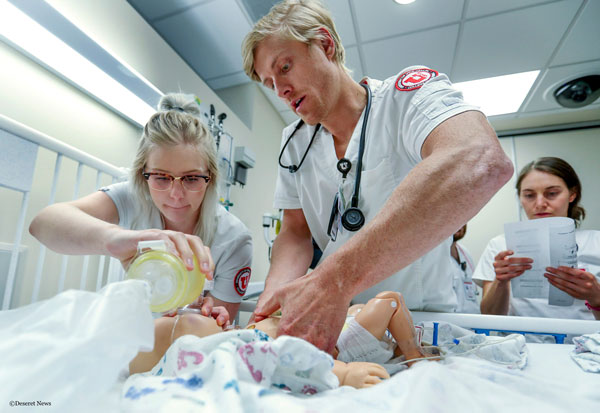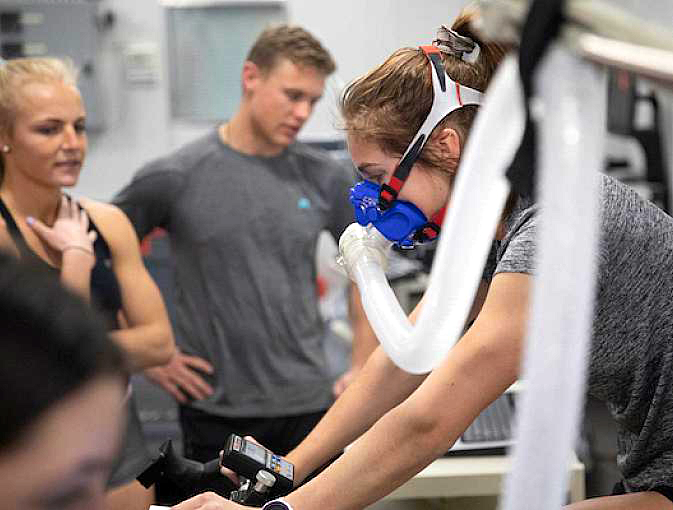The Center seeks to help all students, faculty, and staff come to a better understanding of the interwoven components in health ethics, arts, and humanities by facilitating collaborative teaching partnerships in each of the schools, colleges, departments, and programs which are part of the University of Utah Health Sciences & Main Campuses.
Curriculum taught by Center Members
*make sure to check each tab for details
SCHOOL OF MEDICINE (SOM)
CORE CURRICULUM
FOUNDATIONS of Medicine
Required course for first-year medical students
MD ID 7300 - Foundations of MedicineEthics, arts, and humanities topics are interwoven throughout the curriculum of this course. Each unit ties in with the Medical School themes and relates back to the those previously introduced. At the end, a capstone case study integrates the ethics, arts, and humanities concepts taught throughout the course. The following units have been taught by Center faculty:
|
LAYERS of Medicine
Required course, runs longitudinally throughout all four years of medical school
MD ID 7101 - Layers of Medicine 1
|
ELECTIVES
Dr/Pt Relationship in Literature & the Arts
Two intensive electives for advanced medical students exploring healthcare through the arts and humanities
INTMD 7992
|
|
|
INTMD 7994
|
HEALTH LAW for Non-lawyers
Spring 2022 and 2023 have been cancelled due to lack of funding, but will be taught in 2024 if there is funding
INTERPROFESSIONAL EDUCATION ELECTIVES (IPE)
|
COURSES TAUGHT
PRIOR TO THE
2022-23
ACADEMIC YEAR
LITERATURE & MEDICINE
Fall 2006/Spring 2007
STUDENT DISCUSSION GROUPwith Tess Jones, PhD, and Mark Matheson, DPhil, Division of Medical Ethics and Humanities |
MEDICAL ETHICS
REQUIRED COURSE - 4th Year Medical StudentsThe timing and content of this course are based on two assumptions. First, that 4th year medical students have had sufficient exposure to clinical medicine to appreciate the relevance and importance of their ethical issues in medicine. And second, that medical ethics presents issues of sufficient importance that all medical students must have a solid foundation in these issues and concepts before they begin their post-graduate training. Course Objectives:
Topics covered:
|
Patient-Physician Relationship
The Patient-Physician Relationship is a component of Medical Professionalism, a 1st year medical student course.
The following two small groups sessions are a beginner's guide to medical professionalism both as a dynamic activity of contemporary practice and as a set of values and virtues associated with the noble and ancient history of medicine. The materials for these sessions include:
- Readings for discussion
- One "outside" writing assignment due at Session I
- One "in-class" brainstorming session due during Session II
Session I - "Contemporary Professionalism and Professional Virtues"Objectives of this small group session are:
|
Session II - "Oaths, Codes, and Rules of Professionalism"Objectives of this small group session are:
|
COLLEGE OF PHARMACY (COP)


While the Center has a long history with the School of Medicine, we look forward to expanding our collaborative partnerships throughout all the schools and colleges within the Health Sciences in order to enhance understanding of health ethics, arts, and humanities on all learning levels.
For examples of opportunities we can facilitate in the future, read more about what we've been doing within the School of Medicine and on Main Campus.
COLLEGE OF NURSING (CON)


While the Center has a long history with the School of Medicine, we look forward to expanding our collaborative partnerships throughout all the schools and colleges within the Health Sciences in order to enhance understanding of health ethics, arts, and humanities on all learning levels.
For examples of opportunities we can facilitate in the future, read more about what we've been doing within the School of Medicine and on Main Campus.
COLLEGE OF HEALTH (COH)


While the Center has a long history with the School of Medicine, we look forward to expanding our collaborative partnerships throughout all the schools and colleges within the Health Sciences in order to enhance understanding of health ethics, arts, and humanities on all learning levels.
For examples of opportunities we can facilitate in the future, read more about what we've been doing within the School of Medicine and on Main Campus.
SCHOOL OF DENTISTRY (SOD)


While the Center has a long history with the School of Medicine, we look forward to expanding our collaborative partnerships throughout all the schools and colleges within the Health Sciences in order to enhance understanding of health ethics, arts, and humanities on all learning levels.
For examples of opportunities we can facilitate in the future, read more about what we've been doing within the School of Medicine and on Main Campus.
MAIN CAMPUS
UNDERGRAD
Block U
MEDICAL HUMANITIES PROGRAM
Block U is no longer being offered starting Fall 2022
UGS 2250/2255: Block U: Medical Humanities
Medical Humanities was a collaborative effort from faculty who are part of the College of Humanities, Center for Health Ethics, Arts, and Humanities (CHeEtAH), and Utah Center of Excellence ELSI Research (UCEER).
This year-long course was designed to introduce undergraduate students to a variety of Ethical, Legal and Social Implications of Research (ELSI) issues and facilitating their process in creating an ELSI module for the widely-used Learn.Genetics: Genetic Science Learning Center website. In the fall semester, students were introduced to a range of ELSI issues, such as the history of eugenics, genetic testing and screening, concerns about enhancement, and discussions of disability and “normalcy.” Then, in the spring, students worked closely with staff from Learn.Genetics to envision, design, and develop, a module for their website that will introduce their selected ELSI issue to the website’s target audience (primarily secondary school educators and students). In one of the earliest iterations of this course, the students learned about arguments for and against parents using preimplantation genetic diagnosis to perform sex selection, and then designed a module that conveys the tension between advocacy of reproductive rights and concerns about sex discrimination.
RATS
RESEARCH ADMINISTRATION TRAINING SERIES
RED 731: Case Studies in the Responsible Conduct of Research (RCR)The responsible conduct of research (RCR) is a relatively new discipline. It is focused on the multifaceted social and ethical issues that arise in the practice of scientific research. But scientific research itself is hundreds, perhaps even thousands, of years old. Reflecting on this history of biology, chemistry, physics and medicine provides insightful examples of both responsibly conducted research, and irresponsibly conducted research, by some of the most famous scientists in history. Participants will examine a number of notable cases from the history of science and will consider how prominent scientists and their research would fare in the modern age of RCR. |